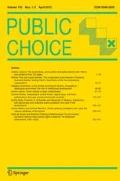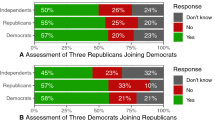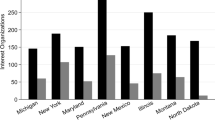Abstract
Many allege that Superfund is a pork-barrel program that serves self-interested federal legislators. An earlier empirical study found that Superfund cleanup priorities and expenditures were not dictated by congressional committee influence, but rather largely by public interest concerns. Despite this apparent denial of classic distributive politics, it is important to recognize that pork also can arise from legislators voting to expand programs when their constituents stand to benefit disproportionately. This study examines important House and Senate votes on Superfund for their correspondence to theories of congressional self-interest and ideology. On the whole, and despite its theoretical appeal as a potentially-classic pork-barrel program, congressional voting on Superfund is found to represent legislator's environmental and liberal ideologies as much as (if not more than) narrowly-defined self-interest. Along with the results of a previous study, this should be taken as evidence that Superfund has not consistently been a typical pork-barrel program, and that its rapid expansion and legislative support must be explained by other factors, including its symbolic environmental appeal.
Similar content being viewed by others
References
Ackerman, B.A. and Hassler, W. (1981).Clean coal, dirty air. New Haven, CT: Yale University Press.
Arnold, R.D. (1979).Congress and the bureaucracy: A theory of influence. New Haven, CT: Yale University Press.
Bender, B. (1988). An analysis of congressional voting on legislation limiting congressional campaign expenditures.Journal of Political Economy (October): 1005–1021.
Calvert, R.L., Moran, M.J. and Weingast, B.R. (1987). Congressional influence over policy making: The case of the FTC. In M.D. McCubbins and T. Sullivan (Eds.),Congress: Structure and policy, 493–522. Cambridge: Cambridge University Press.
Cohen, S. (1984). Defusing the toxic time bomb: Federal hazardous waste programs. In N. Vig and M. Kraft (Eds.),Environmental policy in the 1980s: Reagan's new agenda. Washington, DC: Congressional Quarterly Press.
Congressional Quarterly Weekly Report, 17 March 1984.
Crandall, R.W. (1983).Controlling industrial pollution: The economics and politics of clean air. Washington, DC: The Brookings Institution.
Fenno, R.F., Jr. (1973).Congressmen in committees. Boston: Little, Brown.
Ferejohn, J.A. (1974).Pork barrel politics: Rivers and harbors legislation, 1947–1968. Stanford, CA: Stanford University Press.
Hird, J.A. (1990). Superfund expenditures and cleanup priorities: Distributive politics or the public interest?Journal of Policy Analysis and Management 9 (Fall): 455–483.
Kalt, J.P. and Zupan, M.A. (1984). Capture and ideology in the economic theory of politics.American Economic Review 74 (June): 279–300.
Kalt, J.P. and Zupan, M.A. (1990). The apparent ideological behavior of legislators: Testing for principal agent slack in political institutions.Journal of Law and Economics 33 (April): 103–131.
Kau, J.B. and Rubin, P.H. (1979). Self-interest, ideology, and logrolling in congressional voting.Journal of Law and Economics (October): 365–384.
Kennedy, P. (1985).A guide to econometrics, second edition. Cambridge, MA: MIT Press.
Kerr, P. (1989). New Jersey debate: Long of quips, loose on facts.New York Times, 27 September.
Kingdon, J.W. (1973).Congressmen's voting decisions. Ann Arbor, MI: University of Michigan Press.
Mansbridge, J.J. (Ed.) (1990).Beyond self-interest. Chicago: University of Chicago Press.
Mayhew, D.R. (1974).Congress: The electoral connection. New Haven, CT: Yale University Press.
Moe, T.M. (1987). An assessment of the positive theory of “Congressional Dominance,”Legislative Studies Quarterly 12 (November): 475–520.
Moe, T.M. (1989). The politics of bureaucratic structure. In J.E. Chubb and P.E. Peterson (Eds.),Can the government govern?, 267–329. Washington, DC: The Brookings Institution.
Ornstein, N. (1990). The permanent democratic congress.The Public Interest 100 (Summer): 24–44.
Pashigian, P. (1985). Environmental regulation: Whose self-interests are being protected?Economic Inquiry 23 (October): 551–584.
Peltzman, S. (1984). Constituent interest and congressional voting.Journal of Law and Economics 27 (April): 181–210.
Peltzman, S. (1989). The economic theory of regulation after a decade of deregulation. In M.N. Baily and C. Winston (Eds.),Brookings papers on economic activity: Microeconomics, 1–41. Washington, DC: The Brookings Institution.
Portney, P.R. (1988). Reforming environmental regulation: Three modest proposals.Issues in Science and Technology 4 (Winter): 74–81.
Roper Organization. (1990).Roper Reports 90-2. New York, NY.
Sabato, L. (1987). Real and imagined corruption in campaign financing. In A.J. Reichley (Ed.),Elections American style, 155–179. Washington, DC: The Brookings Institution.
Schneider, K. (1990). Cost of cleanup at nuclear sites is raised by 50%.New York Times, 4 July: 1.
Stockman, D.A. (1975). The social pork barrel.The Public Interest 39 (Spring): 3–30.
Stroup, R.L. and Shaw, J.S. (1989). The free market and the environment.The Public Interest 97 (Fall): 30–43.
Train, K. (1986).Qualitative choice analysis: Theory, econometrics, and an application to automobile demand. Cambridge, MA: MIT Press.
U.S. Congress. Office of Technology Assessment. (1989, October).Coming clean: Superfund problems can be solved. Washington, DC: U.S. Government Printing Office.
U.S. Congress. Office of Technology Assessment. (1985, April).Superfund strategy. Washington, DC: U.S. Government Printing Office.
U.S. Environmental Protection Agency. Office of Policy, Planning, and Evaluation. (1987, February).Unfinished business: A comparative assessment of environmental problems. Washington, DC: U.S. Government Printing Office.
U.S. Senate Subcommittee on Superfund, Ocean and Water Protection. (1989, May).Lautenberg-Durenberger report on Superfund implementation: Cleaning up the nation's cleanup program. Washington, DC: Committee on Environment and Public Works.
Waas, M. (1989). HUD/EPA slush funds: The White House connection.The Nation, 20 November.
Weingast, B.R., Shepsle, K.A. and Johnsen, C. (1981). The political economy of benefits and costs.Journal of Political Economy (August): 642–664.
Yandle, B. (1989). The political limits on environmental regulation: Tracking the unicorn. New York: Quorum Books.
Author information
Authors and Affiliations
Additional information
This research was funded in part by a Faculty Research Grant from the Graduate School of the University of Massachusetts at Amherst.
Rights and permissions
About this article
Cite this article
Hird, J.A. Congressional voting on Superfund: Self-interest or ideology?. Public Choice 77, 333–357 (1993). https://doi.org/10.1007/BF01047874
Accepted:
Issue Date:
DOI: https://doi.org/10.1007/BF01047874




